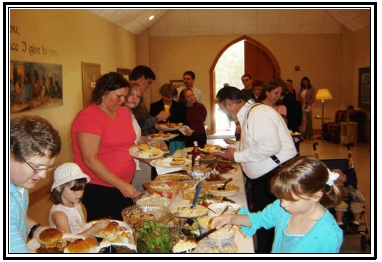The need for shelter is a fundamental human need. None of us ever knows for sure when we might be uprooted and cast on the mercy of others. But how do we overcome our fear in order to welcome and shelter a stranger? The Christian practice of hospitality is the practice of providing a space to take in a stranger. It also encompasses the skills of welcoming friends and family to our tables, to claim the joy of homecoming. In the Bible, offering hospitality is a moral imperative. God’s people remember that they were once strangers and refugees who were taken in by God (Deuteronomy 10:19). What would it mean to “love the alien as yourself” (Leviticus 19:34) in our own community or city? Hospitality is more than something we might offer out of the goodness of our hearts if and when it was convenient. Ever notice how whenever Jesus shares meals with others, “guests” become “hosts” and “hosts” become “guests”? Guests to our community end up as hosts, giving us the gift of their presence. When an act of hospitality is well done, it not only welcomes strangers, but also recognizes their holiness. How are strangers welcomed to our faith community? Can you identify individuals in your midst who seem to practice hospitality especially well? What do the physical spaces in which you live “say” to strangers and newcomers? How are strangers invited to share their gifts within our homes … our workplace … our congregation? Hospitality is not the job of a few who take on the role on the behalf of the rest of us. Hospitality is made up of hard work undertaken under risky conditions by all of us. How might the effectiveness of individual gestures of hospitality be bolstered through the strength of community? How can being part of a Christian community help us overcome fear of being a host or a guest? How might corporate worship shape our moral imaginations and nurture a civic climate characterized by hospitality to the strangers in our midst?
